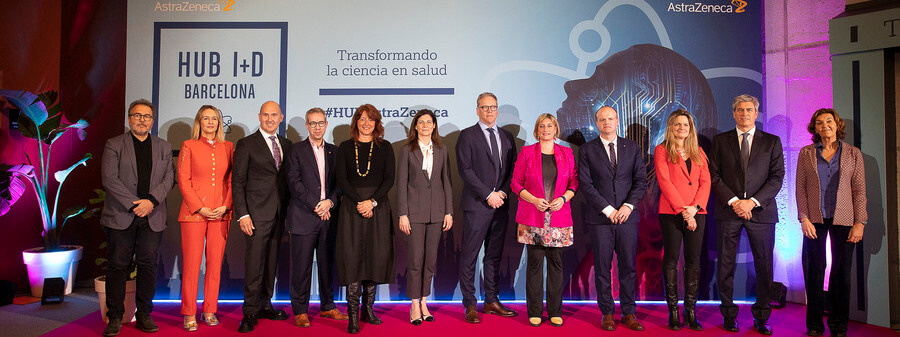
Maria Terrades participated in the presentation ceremony of AstraZeneca’s European innovation hub
Maria Terrades, CEO of the Barcelona Science Park, took part yesterday in the presentation ceremony of AstraZeneca’s European R&D hub, within the framework of the institutional meeting “Transforming Science into Health”, which was addressed by the president of the Government of Catalonia, Pere Aragonès; the secretary general of Research of the Ministry of Science and Innovation, Raquel Yotti; the deputy mayor of the Barcelona City Council, Laia Bonet; the president of AstraZeneca in Spain, Rick R. Suárez; and its vice-president for Europe and Canada, Stefan Woxtröm, among other representatives of scientific and business institutions. This is the largest foreign R&D investment project in Catalonia’s history.
AstraZeneca will invest some 800 million euros in the next five years in a new European R&D centre in Barcelona, which will signify the creation of 1,000 highly-qualified new jobs. Yesterday, the pharmaceutical company officially presented the project in the auditorium of the Torre Glòries, within the framework of the conference “Transforming Science into Health”.
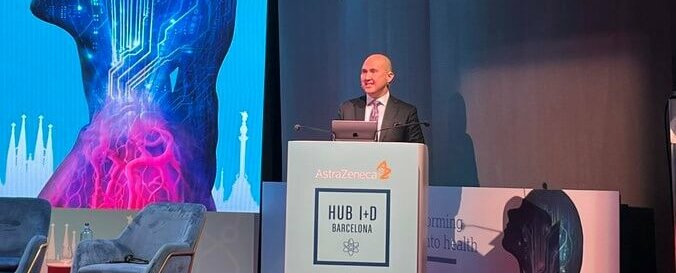
Rick R. Suárez (Photo: AstraZeneca).
Rick R. Suárez, country president Spain at AstraZeneca, opened the event, declaring that “We are truly thrilled that this European hub has been established in Spain and specifically in Barcelona. This is a solid commitment by our company to this country, with the focus on intensifying growth through innovation, always centred on the patients’ unmet needs, and using digital technology and data science to advance with cutting-edge science. AstraZeneca focuses on a model of collaboration with the local institutions, oriented along three primary lines: promotion of basic and preclinical research, participation of Spanish researchers and centres in all the international clinical trials, and support for initiatives promoted by independent researchers.”
In Spain in 2021, AstraZeneca’s investment in innovative projects amounted to more than 93 million euros, of which 48 million euros were allocated to R&D. In 2022, the total commitment of the pharmaceutical group in Spain, including Alexion, signified a total investment of some 400 million euros, demonstrating the company’s reinforced confidence in Spain.
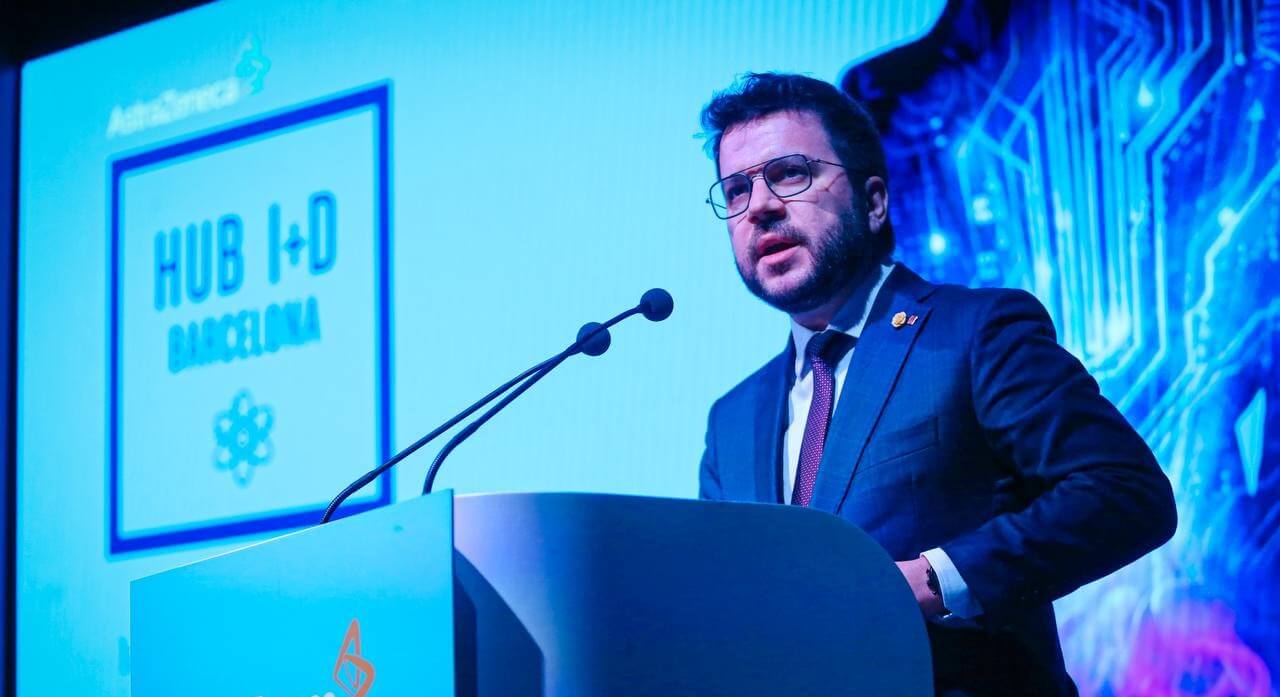
President Pere Aragonès (Photo; Government of Catalonia).
The meeting was closed by Pere Aragonès, president of the Government of Catalonia, who said “with projects like that of AstraZeneca, Catalonia reinforces its position as the most important hub of medical sciences in the south of Europe.” In addition, Aragonès pointed out, this is “the largest foreign investment in R&D in the history of the country,” and he concluded by thanking the firm for its “commitment to Catalonia” and encouraged it to continue generating “new opportunities.”
According to Raquel Yotti, secretary general of Research of the Ministry of Science and Innovation, “the Government of Spain, basically within the framework of the PERTE [Strategic Plan for Economic Recovery and Transformation] of Avant-Garde Healthcare, has reinforced its efforts to promote transformation of the healthcare system through science and innovation. To achieve this goal, it is crucial to have strategic alliances and investments of large companies which not only recognise Spain’s leading role in clinical research but also commit to innovative models of scientific collaboration such as those designed by Alexion to facilitate transfer of know-how and provide responses to patients’ needs.”
Laia Bonet, deputy mayor for the Agenda 2030, Digital Transition, Sports and Territorial and Metropolitan Coordination of the Barcelona City Council, pointed out that “investing in health, research and innovation also entails broadening the city’s business sector, strengthening the productive system of the metropolitan area and consolidating ourselves as a cluster of reference in the life sciences and healthcare at the countrywide level and in the South of Europe. In the coming years, therefore, science and health will have a pivotal role in the future of Barcelona, as is demonstrated by commitments as important as that made by AstraZeneca with the installation of its new R&D centre.”
The importance of a good R&D ecosystem
The event also included a round table under the title “The importance of a good R&D ecosystem”, with the participation of Maria Terrades, CEO of the Barcelona Science Park; Albert Castellanos, secretary for Business and Competitiveness of the Generalitat and managing director of ACCIÓ; Gonzalo de Miquel, vice president of Clinical Development at Alexion and head of the Barcelona AstraZeneca R&D hub; and Antoni Plasencia, director general of the Barcelona Global Health Institute (ISGlobal).
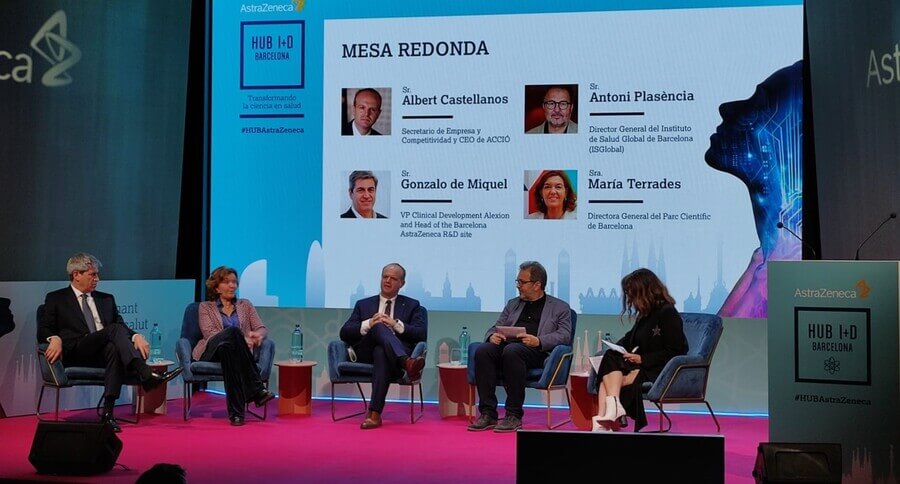
Snapshot of the roundtable (Photo: AstraZeneca).
Maria Terrades recalled that “in Catalonia we have a very deeply-rooted pharmaceutical tradition, but the progress made in healthcare in the last 30 years has been spectacular, and I believe the Park has been an important axis in this evolution. At the moment when it was founded in 1997 by the University of Barcelona, it was decided that it would be a cluster of public research, transfer and companies in order for this research to reach the market, to reach people, and for us to experience this as a series of improvements in our health. And today, 25 years later, the Park is recognised as a European centre of reference for scientific, technological and corporate innovation.”
And this has been made possible because “every day we are around 3,500 people working in the Park, in some 125 entities, including very powerful public research centres, spin-offs of these centres and other public centres, startups, and also small and medium-sized enterprises and research centres of large pharmaceutical firms, all coexisting within a unique ecosystem.”
Terrades also highlighted the Park’s commitment to the sector of life sciences and healthcare. “Not only have we made great efforts for our community to work together, but we have a very close interrelationship with the administrations and other public and private bodies”. The BCN Health Booster accelerator, which the Science Park has set in motion with the University of Barcelona, the City Council and Biocat, is the latest example of this. Five spin-offs and six startups are participating in the first edition of the programme. “We have completed the first year with spectacular results, and I believe many of these companies will be referents in the future.”
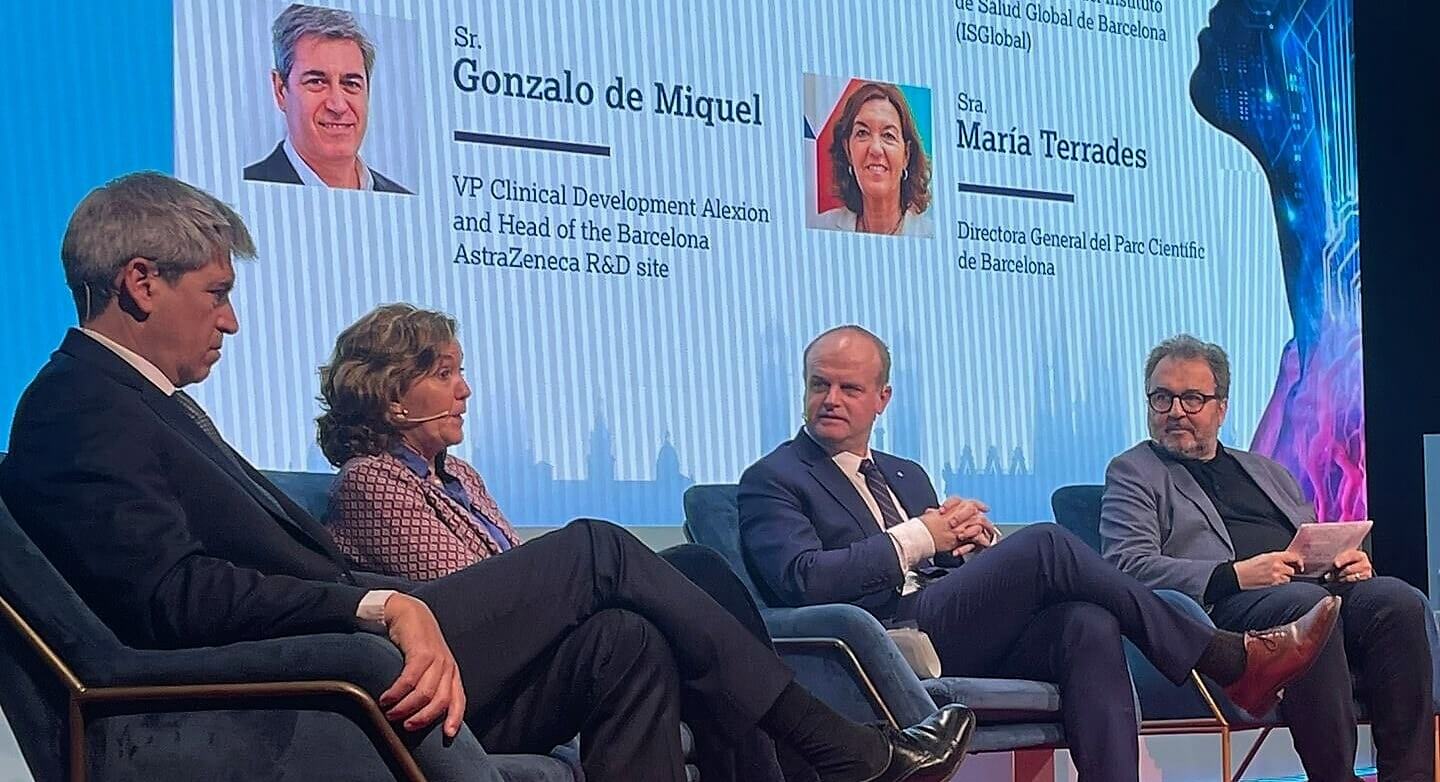
Maria Terrades, in a moment of her speech (Photo: AstraZeneca).
The enlargement of spaces is now the great challenge to be faced. “We have reached full occupancy much earlier than we foresaw: we had a plan for filling the 100,000 m² in 2025.” In this respect, the MIES-UB project, which entails the reorganisation of the spaces of the southern part of the Campus Diagonal, will be a core strategy for responding to the high demand for the Park: it already contemplates enlarging its premises with the construction of a building of 10,000 m² dedicated entirely to research activities in the field of life sciences.
Maria Terrades ended by insisting that public-private collaboration in healthcare is the core strategy of the welfare of any society, benefiting people and creating wealth. “Working together we will go very, very far,” she concluded.
The rest of the participants also agreed in emphasising the importance of this cooperation and the high level of Spanish professionals and the country’s R&D ecosystem. In fact, Spain has authorised more than 900 clinical trials with drugs, and Catalonia alone has 91 research centres and over 1,300 companies working in the biopharmaceutical, healthcare, medtech and digital healthcare fields.
Barcelona, a strategic location for the company
AstraZeneca’s global R&D centre in Barcelona will coordinate international projects in the company’s five main therapeutic areas: oncology; cardiovascular, renal and metabolism; respiratory diseases and immunology; vaccines and immunotherapies; and rare diseases. With specialised technological and professional resources in research and information systems dedicated to observational studies and clinical and preclinical trials, the hub aspires to become one of Europe’s most important centres through its excellence in clinical innovation, providing support for advances in treatments addressed to patients’ unmet needs. The installations will host experts in development and clinical operations, pharmaceutical sciences and regulatory matters, drug safety, data analysis and IT, biostatistics and artificial intelligence, among other aspects.
In the words of Stefan Woxström, AstraZeneca’s senior vice-president for Europe and Canada, “This new centre is the first to focus on leading global clinical projects in the discovery and development of new innovative treatments in our five main therapeutic areas. The enlargement of our R&D footprint in Europe is based on our commitment to exploiting the power of science to transform the future of healthcare to enable people to live better and healthier lives.”
Menelas Pangalos, AstraZeneca’s executive vice-president for Biopharmaceutical R&D, said “In the last decade we have managed to multiply almost sixfold the proportion of molecules that successfully complete the phase III clinical trials: from 4% to 23%. Our new R&D centre in Barcelona is the perfect scenario for capitalising on the strength of Spanish talent in our areas of diseases, data sciences, clinical trials and clinical operations to help accelerate the next wave of innovative drugs for patients.”
In the last few years Barcelona has become a strategic location for the company, specifically since at the end of last year it inaugurated, along with Alexion, its clinical trials centre for rare diseases, with an investment of 32 million euros.




